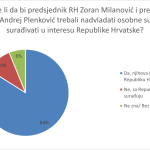ZAGREB, July 30, 2019 – Locating and identifying the remains of those gone missing in the war in the former Yugoslavia is primarily a humanitarian issue and must not be the subject of political dispute between countries in the region, Croatia’s representative told his counterparts from Bosnia and Herzegovina and Serbia in Sarajevo on Tuesday with whom he signed protocols to speed up that process.
Croatian Assistant Veterans’ Affairs Minister Stjepan Sučić, the head of Serbia’s office for missing persons, Veljko Odalović, and the director of the Institute for Missing Persons in Bosnia and Herzegovina, Nikola Perišić, signed documents on the implementation of a previously agreed protocol on cooperation in the search for missing persons.
Croatia is still searching for 1,892 people who went missing during the 1990s Homeland War, yet the previously signed agreements have not produced any progress for that issue to finally be resolved, Sučić recalled. “When the time for action comes, disputes emerge,” he added.
The missing, however, are primarily a humanitarian problem that must be separated from other outstanding issues between countries in the region, he said.
Today’s signing is a “small step forward” and we aren’t expecting “anything spectacular if good will doesn’t exist and if that issue is not treated without any politics or relating it to other outstanding issues,” Sučić said.
The existing agreement on tracing the missing signed with Serbia need to be reviewed as do the rules of procedure so that they are in line with the law on missing persons recently adopted in the Croatian parliament because it is necessary to protect the rights of missing persons and their families too, he said.
Perišić said that the documents signed today define the method of cooperation and exchange of information, including the exhumation and handing over of remains.
There are still about 12,000 people considered to have gone missing during the wars in the entire area of the former Yugoslavia and morgues throughout the region contain the remains of about 4,000 people that have not been identified.
He added that in Bosnia and Herzegovina alone there are about 7,200 missing persons and without institutional cooperation that search would be an impossible mission.
Odalović said that Serbia is prepared for cooperation without any restrictions so that the issue of those gone missing during the 1990s wars can be resolved, but considering the nature of all those conflicts, that problem cannot be solved without regional cooperation.
“There has to be a regional search mechanism” Odalović said, adding that country borders must not be an obstacle in the search for the war missing.
More news about the Homeland War can be found in the Politics section.








